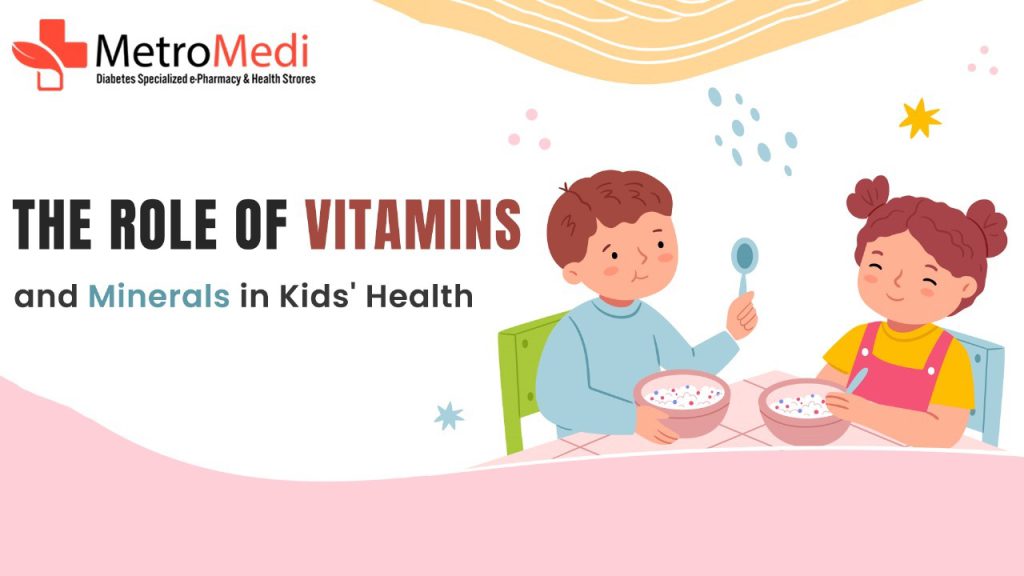
When it comes to growing healthy and strong, nutrition plays a crucial role in a child’s development. Among the key components of a balanced diet are vitamins and minerals in food, essential nutrients that support various bodily functions and contribute to overall well-being. Understanding the importance of these nutrients can help parents make informed choices for their children’s health.
Why Are Vitamins and Minerals Important?
Vitamins and minerals are organic compounds and inorganic elements, respectively, that our bodies need in small amounts to function optimally. They are vital for:
- Growth and Development: Vitamins like A, C, and D are critical for children’s growth, helping with bone development, immune function, and vision.
- Energy Production: B vitamins play a significant role in converting food into energy, which is essential for active kids.
- Bone Health: Minerals such as calcium and phosphorus are crucial for developing strong bones and teeth.
- Immune Function: Vitamins C and D, along with zinc, help strengthen the immune system, protecting kids from illnesses.
- Brain Health: Omega-3 fatty acids, along with vitamins E and B-complex, support cognitive function and memory development.
Vitamins and Minerals Examples and Their Functions
- Vitamin A: Essential for vision, immune function, and skin health. Found in foods like carrots, sweet potatoes, and spinach.
- Vitamin C: Important for the immune system, wound healing, and iron absorption. Citrus fruits, strawberries, and bell peppers are great sources.
- Vitamin D: Supports bone health and immune function. Sunlight exposure is a natural source, along with fortified foods and fatty fish.
- B Vitamins: A group that includes B1 (thiamine), B2 (riboflavin), B3 (niacin), B6, B12, and folate. These vitamins are essential for energy production, brain function, and red blood cell formation. Found in whole grains, meats, eggs, and leafy greens.
- Calcium: Vital for bone and teeth development. Dairy products, leafy greens, and fortified plant milks are excellent sources.
- Iron: Crucial for transporting oxygen in the blood and preventing anaemia. Found in red meat, beans, lentils, and fortified cereals.
- Zinc: Important for immune function and wound healing. Sources include meat, shellfish, legumes, and seeds.
- Magnesium: Supports muscle and nerve function, as well as energy production. Nuts, seeds, whole grains, and leafy greens are good sources.
How Important Are Vitamins for Kids?
Vitamins are incredibly important for children because they contribute to optimal growth and development. Without adequate vitamins, kids may experience delays in physical development, weakened immune systems, and even cognitive challenges. This makes it essential to include a variety of vitamin-rich foods in their diet.
The Role of Vitamins and Minerals in the Body
The role of vitamins and minerals in the body cannot be overstated. They help regulate bodily functions, contribute to the formation of cells, and maintain overall health. From supporting metabolism to promoting a healthy immune response, these nutrients are essential for every child’s well-being.
Why Do Growing Children Need More Minerals and Vitamins?
As children grow, their bodies require additional nutrients to support rapid development. Growing children need more minerals and vitamins because they are in a constant state of growth, which demands more energy and nutrients. This increased need can be met through a balanced diet rich in whole foods, including fruits, vegetables, grains, and proteins.
Best Supplement for Child Growth
If you’re concerned that your child may not be getting enough nutrients from food alone, you might consider the best supplements for child growth. Always consult a healthcare provider before starting any supplementation, as they can help determine the right options based on your child’s specific needs.
How to Ensure Kids Get Enough Vitamins and Minerals
- Balanced Diet: Encourage a variety of foods from all food groups. Aim for colourful plates filled with fruits, vegetables, whole grains, lean proteins, and healthy fats.
- Limit Processed Foods: Processed foods often lack essential nutrients and are high in added sugars and unhealthy fats. Focus on whole, minimally processed options.
- Educate and Involve: Teach children about nutrition and involve them in meal planning and preparation to foster a positive relationship with food.
- Supplement Wisely: If you’re concerned your child may not be getting enough vitamins and minerals, consult a healthcare provider before starting any supplements. Whole foods are generally the best source of nutrients.
- Regular Check-ups: Regular health check-ups can help monitor your child’s growth and nutritional needs, ensuring they’re on track.
Conclusion
Vitamins and minerals are fundamental to children’s health, impacting everything from growth to cognitive development. By prioritizing a balanced diet filled with nutrient-rich foods, parents can support their children’s health and well-being. Remember, healthy eating habits established in childhood often carry into adulthood, setting the stage for a lifetime of good health.
